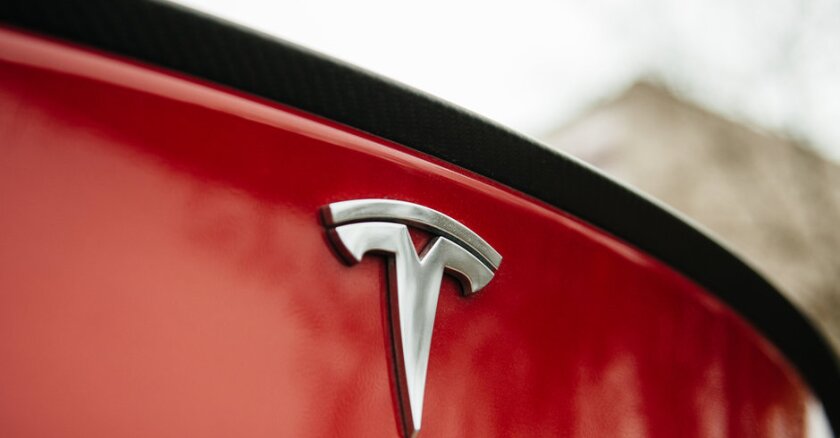After federal highway-safety authorities found that Tesla sedans equipped with the company's oft-criticized "Full Self-Driving" software could cause the vehicles to act unsafely, the company agreed to issue a software update for vehicles with the $15,000 FSD add-on.
The FSD system being tested by Tesla owners on public roads across the U.S. in a beta program might cause crashes as it "may allow the vehicle to act unsafe around intersections, such as traveling straight through an intersection while in a turn-only lane, entering a stop sign-controlled intersection without coming to a complete stop, or proceeding into an intersection during a steady yellow traffic signal without due caution," the National Highway Traffic Safety Administration said in an advisory Wednesday.
"In addition, the system may respond insufficiently to changes in posted speed limits or not adequately account for the driver's adjustment of the vehicle's speed to exceed posted speed limits," the agency said.
Tesla agreed to wirelessly update software on 363,000 vehicles to address the problem. CEO Elon Musk has told investors earlier this year that the FSD software has been deployed to about 400,000 customers.
Affected by the recall are Tesla's Model 3s from 2017 to 2023, Model Ss from 2016 to 2023, Model X from 2016 to 2023, and Model Y from 2020 to 2023. Tesla said it delivered 1.3 million vehicles last year.
Tesla has been under fire over the system and is facing probes by the federal traffic safety agency, as well as a 2021 administrative complaint from the California DMV alleging that the company "deceptively advertised" the FSD and Tesla's "Autopilot" driver-assistance systems in ways that contradict its own warnings that the features still require active driver supervision.
Tesla first installed Autopilot — which according to the company "enables your car to steer, accelerate and brake automatically within its lane" — in 2015, and it's standard issue on all Teslas. The FSD software, according to Tesla, "identifies stop signs and traffic lights and slows your car to a stop on approach."
The system has been blamed for accidents, including an eight-vehicle crash on the Bay Bridge late last year that injured nine people in which the driver told police he had FSD turned on at the time and the crash was triggered by the car braking suddenly by itself.
As of November, the safety agency was investigating 35 Tesla crashes since 2016 in which either FSD or Autopilot systems likely were in use. Nineteen people were killed in the crashes.
The FSD software continues to cast a shadow over Tesla, said Wedbush Securities analyst Dan Ives. "But I view this as a step forward toward correcting the issues that they've had over the past few years," Ives said. "It's a downloadable update, so I don't think it significantly is a black eye."
"Even though it's been a very bumpy road, I believe they'll get over these hurdles and I think 'FSD' over the next five years will unlock more value," he said.
Software entrepreneur Dan O'Dowd, whose anti-FSD group The Dawn Project ran an ad attacking FSD during last weekend's Super Bowl NFL football game, contended in a news release Thursday that the software was unsafe for public roads. "Elon Musk's decision to use the American public as crash test dummies has exposed millions of drivers, pedestrians and cyclists to potentially fatal danger," O'Dowd said.
The company did not respond to a request for comment Thursday. Musk, notoriously defiant of government regulations, tweeted Thursday about the recall, saying, "The word 'recall' for an over-the-air software update is anachronistic and just flat wrong!"
Early last year, Tesla recalled close to 54,000 vehicles because their FSD software let them roll past stop signs without actually stopping. That recall also took the form of a wireless software update.
Tesla moved its headquarters from Palo Alto to Texas in late 2021 and continues to operate a major car factory in Fremont.
The recall came after the safety agency "advised Tesla that it had identified potential concerns related to certain operational characteristics of FSD Beta," the agency said in the notification.
Tesla has been installing hardware for its FSD system since 2016, progressively making it available to selected users.
Tesla says on its website that FSD does "not make the vehicle autonomous" and it requires "a fully attentive driver, who has their hands on the wheel and is prepared to take over at any moment."
A September lawsuit by a Tesla owner from Sacramento referenced a 2016 promotional video for "Enhanced Autopilot" and "Full Self-Driving," with text saying the person in the driver's seat was "not driving anything" and that "the car is driving itself." Tesla employees later revealed the car was benefiting from mapping software unavailable to Tesla customers "and that the car still performed poorly and even ran into a fence during filming," the lawsuit claimed.
© 2023 Silicon Valley, San Jose, Calif. Distributed by Tribune Content Agency, LLC.














